1
00:00:00,000 –> 00:00:01,557
Olá!
{{Hello!}}
2
00:00:01,557 –> 00:00:04,871
Hoje estamos aqui no parque
{{We’re here in the park today}}
3
00:00:05,080 –> 00:00:08,243
e vou falar-vos sobre pares mínimos.
{{and I’m going to talk to you about minimal pairs.}}
4
00:00:08,300 –> 00:00:11,080
O que são pares mínimos, Damiana?
{{What are minimal pairs, Damiana?}}
5
00:00:11,640 –> 00:00:13,871
Pares mínimos são palavras
{{Minimal pairs are words}}
6
00:00:13,871 –> 00:00:16,360
que têm a mesma pronunciação,
{{that have the same pronunciation,}}
7
00:00:16,360 –> 00:00:19,560
mas que têm um som que as torna diferentes.
{{but have one sound that makes them different.}}
8
00:00:20,240 –> 00:00:22,057
Vamos fazer um jogo.
{{Let’s play a game.}}
9
00:00:22,057 –> 00:00:24,537
Eu vou dizer uma palavra
{{I’m going to say a word}}
10
00:00:24,737 –> 00:00:27,838
e vocês têm que adivinhar se será
{{and you have to guess if it’ll be}}
11
00:00:27,840 –> 00:00:30,400
esta ou esta palavra, ok?
{{this word or this word, ok?}}
12
00:00:30,400 –> 00:00:32,880
Vamos começar com a primeira palavra.
{{Let’s start with the first word.}}
13
00:00:33,080 –> 00:00:35,320
14
00:00:35,520 –> 00:00:37,240
15
00:00:37,320 –> 00:00:40,643
Estarei a dizer esta palavra ou esta palavra?
{{Am I saying this word or this word?}}
16
00:00:41,014 –> 00:00:42,240
17
00:00:42,571 –> 00:00:44,990
Estou a dizer esta palavra.
{{I’m saying this word.}}
18
00:00:44,990 –> 00:00:45,971
À.
{{To the.}}
19
00:00:46,080 –> 00:00:50,253
Esta palavra é uma preposição de movimento.
{{This word is a preposition of movement.}}
20
00:00:50,453 –> 00:00:52,000
Junta duas coisas,
{{It joins two things,}}
21
00:00:52,080 –> 00:00:56,520
o artigo feminino “a”, mais a preposição “a”.
{{the feminine article “the”, plus the preposition “to”.}}
22
00:00:56,600 –> 00:00:58,300
Vamos para a próxima.
{{Let’s go to the next one.}}
23
00:00:58,300 –> 00:01:01,029
24
00:01:01,229 –> 00:01:03,086
25
00:01:03,271 –> 00:01:05,329
Estarei a dizer esta palavra
{{Am I saying this word}}
26
00:01:05,329 –> 00:01:06,771
ou esta palavra?
{{or this word?}}
27
00:01:06,771 –> 00:01:07,771
28
00:01:09,440 –> 00:01:11,643
Estou a dizer esta palavra, “é”,
{{I’m saying this word, “it’s”,}}
29
00:01:11,643 –> 00:01:13,000
verbo ser.
{{(from the) verb ‘to be’.}}
30
00:01:13,000 –> 00:01:14,071
Eu sou,
{{I am,}}
31
00:01:14,071 –> 00:01:15,143
tu és,
{{you are,}}
32
00:01:15,143 –> 00:01:16,357
ele é.
{{he is.}}
33
00:01:16,357 –> 00:01:17,680
Verbo ser.
{{Verb ‘to be’.}}
34
00:01:17,680 –> 00:01:21,520
Já esta palavra é o nosso “e”,
{{Now this word is our “and”,}}
35
00:01:21,520 –> 00:01:23,771
que significa “and”, não é?
{{which means “and”, right?}}
36
00:01:23,771 –> 00:01:24,884
E.
{{And.}}
37
00:01:24,943 –> 00:01:26,786
Eu e tu.
{{Me and you.}}
38
00:01:26,912 –> 00:01:27,488
E.
{{And.}}
39
00:01:27,560 –> 00:01:28,720
Vamos à próxima.
{{Let’s go to the next one.}}
40
00:01:28,920 –> 00:01:32,057
41
00:01:32,286 –> 00:01:35,171
42
00:01:35,371 –> 00:01:38,250
Estarei a dizer esta ou esta palavra?
{{Am I saying this word or this word?}}
43
00:01:38,450 –> 00:01:41,120
44
00:01:42,229 –> 00:01:44,240
Estou a dizer esta palavra,
{{I’m saying this word,}}
45
00:01:44,240 –> 00:01:45,743
“sou”, o verbo ser,
{{“I’m”, the verb ‘to be’,}}
46
00:01:45,743 –> 00:01:49,200
eu sou, sou.
{{I am, I’m.}}
47
00:01:49,200 –> 00:01:52,429
Esta palavra é “só”, “só”.
{{This word is “only”, “only”.}}
48
00:01:52,429 –> 00:01:54,160
O nosso O é mais aberto.
{{Our O is more open.}}
49
00:01:54,360 –> 00:01:56,371
Só.
{{Only.}}
50
00:01:56,371 –> 00:01:59,200
Que significa “just” ou “only”.
{{Which means “just” or “only”.}}
51
00:01:59,200 –> 00:02:00,960
Só.
{{Only.}}
52
00:02:01,040 –> 00:02:03,237
As próximas palavras são duas palavras
{{The next words are 2 words}}
53
00:02:03,243 –> 00:02:06,373
que eu sei que vocês têm muita dificuldade,
{{that I know you have a lot of difficulty with,}}
54
00:02:06,373 –> 00:02:08,787
porque realmente são duas palavras
{{because they really are 2 words}}
55
00:02:08,787 –> 00:02:10,120
que são muito semelhantes.
{{that are very similar.}}
56
00:02:10,200 –> 00:02:15,000
57
00:02:15,371 –> 00:02:17,471
58
00:02:17,500 –> 00:02:20,914
Estarei a dizer esta palavra ou esta palavra?
{{Am I saying this word or this word?}}
59
00:02:21,120 –> 00:02:23,600
As duas são realmente complicadas.
{{The 2 are really complicated.}}
60
00:02:23,600 –> 00:02:25,357
61
00:02:25,429 –> 00:02:27,480
O meu O é fechado.
{{My O is closed.}}
62
00:02:27,480 –> 00:02:29,486
Eu estou a dizer esta palavra.
{{I’m saying this word.}}
63
00:02:29,486 –> 00:02:30,843
Avô.
{{Grandfather.}}
64
00:02:31,243 –> 00:02:32,757
Avó.
{{Grandmother.}}
65
00:02:32,957 –> 00:02:35,614
Avô.
{{Grandfather.}}
66
00:02:35,614 –> 00:02:37,086
Avó.
{{Grandmother.}}
67
00:02:37,086 –> 00:02:39,800
“Avô” é mais fechado.
{{“Grandfather” is more closed.}}
68
00:02:39,800 –> 00:02:42,120
“Avó” é mais aberto.
{{“Grandmother” is more open.}}
69
00:02:42,120 –> 00:02:44,200
Avô, grandfather.
{{Grandfather, grandfather.}}
70
00:02:44,260 –> 00:02:46,000
Avó, grandmother.
{{Grandmother, grandmother.}}
71
00:02:46,080 –> 00:02:47,986
Que palavra estarei a dizer?
{{What word am I saying?}}
72
00:02:48,057 –> 00:02:53,129
73
00:02:53,371 –> 00:02:55,227
Estou a dizer esta palavra,
{{I’m saying this word,}}
74
00:02:55,229 –> 00:02:56,500
porque esta palavra
{{because this word}}
75
00:02:56,500 –> 00:02:59,986
é o artigo definido masculino “o”.
{{is the masculine definite article “the”.}}
76
00:03:00,243 –> 00:03:02,671
O Rui, o Joel.
{{Rui, Joel.}}
77
00:03:02,671 –> 00:03:04,600
O.
{{The.}}
78
00:03:04,729 –> 00:03:07,457
Esta palavra é nasal –
{{This word is nasal -}}
79
00:03:07,591 –> 00:03:08,666
Um.
{{One.}}
80
00:03:08,743 –> 00:03:09,929
Um menino.
{{One boy.}}
81
00:03:09,929 –> 00:03:11,371
Dois meninos.
{{Two boys.}}
82
00:03:11,371 –> 00:03:12,571
Um.
{{One.}}
83
00:03:12,800 –> 00:03:13,640
Um menino.
{{One boy.}}
84
00:03:13,640 –> 00:03:16,314
Vamos a mais um exercício.
{{Let’s do one more exercise.}}
85
00:03:16,400 –> 00:03:18,729
Que palavra estarei a dizer?
{{What word am I saying?}}
86
00:03:18,800 –> 00:03:24,557
87
00:03:24,560 –> 00:03:26,214
Esta ou esta?
{{This one or this one?}}
88
00:03:26,214 –> 00:03:26,960
89
00:03:27,520 –> 00:03:30,120
Estou a dizer esta palavra “pára”,
{{I’m saying this word “stop”,}}
90
00:03:30,120 –> 00:03:32,757
com acento [pré-acordo ortográfico], que significa “stop”.
{{with an accent, that means “stop”.}}
91
00:03:32,757 –> 00:03:34,160
Pára [pré-acordo].
{{Stop.}}
92
00:03:34,240 –> 00:03:38,300
Esta palavra é uma preposição de movimento.
{{This word is a preposition of movement.}}
93
00:03:38,300 –> 00:03:39,243
Para.
{{To.}}
94
00:03:39,243 –> 00:03:40,157
Pára [pré-acordo].
{{Stop.}}
95
00:03:40,157 –> 00:03:41,320
Para.
{{To.}}
96
00:03:41,329 –> 00:03:44,000
Vamos agora fazer uma revisão
{{Now let’s do a review}}
97
00:03:44,000 –> 00:03:46,000
de todos os sons juntos.
{{of all the sounds together.}}
98
00:03:46,200 –> 00:03:47,200
A,
{{The,}}
99
00:03:47,286 –> 00:03:48,000
à.
{{to the.}}
100
00:03:48,200 –> 00:03:49,200
E,
{{And,}}
101
00:03:49,220 –> 00:03:50,080
é.
{{it’s.}}
102
00:03:50,640 –> 00:03:51,514
Sou,
{{I’m,}}
103
00:03:51,714 –> 00:03:52,714
só.
{{only.}}
104
00:03:52,714 –> 00:03:53,914
Avô,
{{Grandfather,}}
105
00:03:53,914 –> 00:03:54,800
avó.
{{grandmother.}}
106
00:03:54,999 –> 00:03:55,999
Um,
{{One,}}
107
00:03:56,200 –> 00:03:56,800
o.
{{the.}}
108
00:03:56,999 –> 00:03:57,999
Pára [pré-acordo],
{{Stop,}}
109
00:03:58,114 –> 00:03:59,200
para.
{{to.}}
110
00:03:59,480 –> 00:04:03,000
Conseguem perceber a diferença [entre estes] sons?
{{Can you tell the difference between these sounds?}}
111
00:04:03,080 –> 00:04:05,992
Espero que tenham gostado deste vídeo,
{{I hope you enjoyed this video,}}
112
00:04:06,080 –> 00:04:07,643
e digam nos comentários
{{and tell us in the comments}}
113
00:04:07,643 –> 00:04:09,585
quantas palavras acertaram,
{{how many words you got right,}}
114
00:04:09,616 –> 00:04:11,043
que nós queremos saber
{{because we want to know}}
115
00:04:11,043 –> 00:04:14,239
como está o vosso ouvido para português.
{{how your ear is for Portuguese.}}
116
00:04:14,439 –> 00:04:15,614
Tchau!
{{Bye!}}
Can You Hear The Difference?
Can You Hear The Difference?
 Damiana
DamianaPlease request our permission before redistributing these files.
With a Premium Subscription, you can also download PDF transcriptions, with or without English translations for printing or offline use.
- 00:00:000Olá! Hello!
- 00:00:011.557Hoje estamos aqui no parque We're here in the park today
- 00:00:055.08e vou falar-vos sobre pares mínimos. and I'm going to talk to you about minimal pairs.
- 00:00:088.3O que são pares mínimos, Damiana? What are minimal pairs, Damiana?
- 00:00:1111.64Pares mínimos são palavras Minimal pairs are words
- 00:00:1313.871que têm a mesma pronunciação, that have the same pronunciation,
- 00:00:1616.36mas que têm um som que as torna diferentes. but have one sound that makes them different.
 Slow audio
Slow audio  Play audio Preposition athe fem.,sing.Community
Play audio Preposition athe fem.,sing.Community  Slow audio
Slow audio  Play audio Determiner, Singular, Feminine abertoopenCommunity
Play audio Determiner, Singular, Feminine abertoopenCommunity  Slow audio
Slow audio  Play audio Adjective / Past Participle, Singular, Masculine avógrandmotherCommunity
Play audio Adjective / Past Participle, Singular, Masculine avógrandmotherCommunity  Slow audio
Slow audio  Play audio Noun, Singular, Feminine avôgrandfatherCommunity
Play audio Noun, Singular, Feminine avôgrandfatherCommunity  Slow audio
Slow audio  Play audio Noun, Singular, Masculine eandCommunity
Play audio Noun, Singular, Masculine eandCommunity  Slow audio
Slow audio  Play audio Conjunction fechadoclosed, lockedCommunity othe masc.,sing.Community
Play audio Conjunction fechadoclosed, lockedCommunity othe masc.,sing.Community  Slow audio
Slow audio  Play audio Article, Singular, Masculine parato, for, in order to, towardsCommunity
Play audio Article, Singular, Masculine parato, for, in order to, towardsCommunity  Slow audio
Slow audio  Play audio Preposition Para!Stop!Community os parespairsCommunity
Play audio Preposition Para!Stop!Community os parespairsCommunity  Slow audio
Slow audio  Play audio Noun, Plural, Masculine os sonssoundsCommunity
Play audio Noun, Plural, Masculine os sonssoundsCommunity  Slow audio
Slow audio  Play audio Noun, Plural, Masculine souI amCommunity
Play audio Noun, Plural, Masculine souI amCommunity  Slow audio
Slow audio  Play audio Conjugated Verbs sóonly, justCommunity
Play audio Conjugated Verbs sóonly, justCommunity  Slow audio
Slow audio  Play audio Adverb umOneCommunity
Play audio Adverb umOneCommunity  Slow audio
Slow audio  Play audio Number àat the, to the fem.,sing.Community
Play audio Number àat the, to the fem.,sing.Community  Slow audio
Slow audio  Play audio Preposition, Contractions, Singular, Feminine éit is, she is, he is, yousing.,formal areCommunity
Play audio Preposition, Contractions, Singular, Feminine éit is, she is, he is, yousing.,formal areCommunity  Slow audio
Slow audio  Play audio Verb
Play audio Verb With a Premium Subscription, you can take save these phrases to Smart Review, and use spaced repetition to commit them to long-term memory.


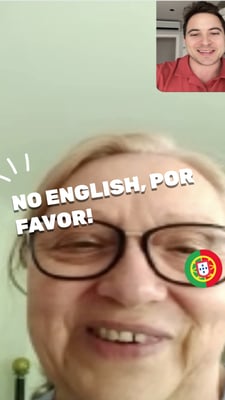

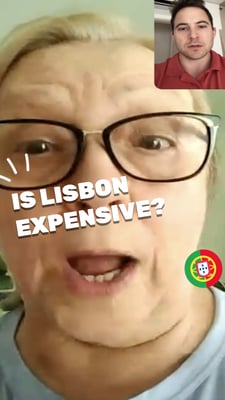
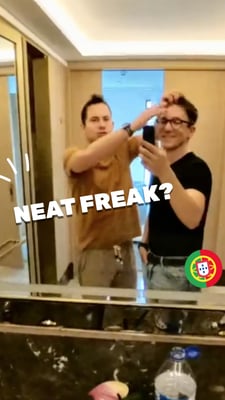
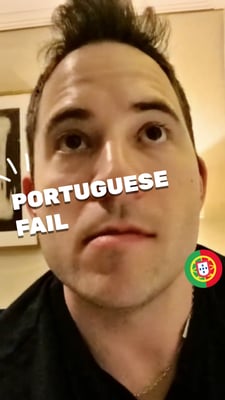


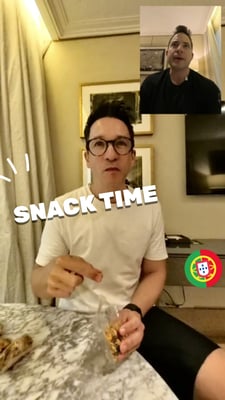
O.M.G. This was SO helpful! Having the words and the similar sounds right together really cemented the difference between them. Also, thank you for having the text of the words in the video. As a visual learner, this was a huge assist. Muito obrigada.
This video was so so helpful, especially getting to hear the difference- comparing word to word- when it is specifically about the accented vowels, Muito muito obrigado!
Very helpful. I hope to see and hear more!